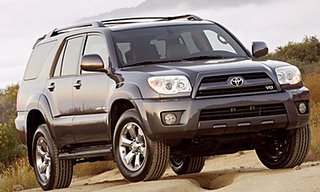Saturday, August 17, 2013
Prices Review 2006 Toyota 4Runner
 The Toyota 4Runner has become increasingly marginal in the competitive midsize sport-utility vehicle market for the past few years, but the significantly redesigned version brings this Toyota up to speed again.
The Toyota 4Runner has become increasingly marginal in the competitive midsize sport-utility vehicle market for the past few years, but the significantly redesigned version brings this Toyota up to speed again.The 4Runner has a familiar name, having been introduced in 1985 with sales of more than 1.2 million units. But the 2002 version was saddled with a 6-year-old design that had to compete with a large number of new sport-utes unveiled in the past few years.
Redesigned and re-engineered for the 2003 model year, Toyotas long-running 4Runner is still a capable off-road sport utility vehicle with rugged body-on-frame construction.
This new fourth-generation 4Runner is bigger than its predecessor, offers a first-ever V8, adds a number of new features including electronic control for steep downhill descents off road and optional curtain and side airbags and provides an improved, bit of refined ride.
Minor trim and feature changes mark 2006 for Toyotas truck-type midsize SUV. 4Runner comes in SR5, Sport Edition, and Limited trim, each with specific styling touches. All offer a V6 or V8 with a 5-speed automatic transmission and standard rear-wheel drive. The V8 can be ordered with all-wheel drive, the V6 with 4WD that can be used on dry pavement. Both systems have low-range gearing and include hill descent control designed to limit speed down steep slopes. Hill ascent control--to avoid sliding backward--is standard linewide.
Pricing is changed, too. While the starting manufacturers suggested retail price is around $27,000 now, a 4Runner with new V8, four-wheel drive and a host of options can actually carry a lofty price tag of more than $42,000.
This is a far cry from the pricing and amenities offered on the truck-ish, rather barebones SUV that the 4Runner started out as in the mid to late 1980s.
Two new engines, old 4-cylinder dropped
The 4Runner now is available with 6- and 8-cylinder engines. The 4Runners 4-cylinder power plant from last year is gone.
The 2003 base engine is a new, 4.0-liter V6 capable of 245 horsepower and 282 lb-ft of torque at 5200 rpm.
Power here is pleasant and not overly brutish, even if torque is not strong enough to snap your head back.
Both performance numbers top those of the Nissan Pathfinders V6 and the inline 6 in the Jeep Grand Cherokee. In fact, the 4Runner V6s 245 horses even top the 235 horsepower provided in the vehicles up-level V8.
The pulling power, or torque, is highest with the 4.7-liter, double overhead cam, i-Force V8. Its a full 320 lb-ft at 3400 rpm.
This compares with 326 lb-ft at 3600 rpm in the Grand Cherokees High-Output V8.
In the test 4Runner with V8, the vehicle felt like it had plentiful power, no matter if I was climbing hills off road or passing vehicles on the highway.
I needed to only depress the accelerator pedal slightly and the power would come on. If I slammed down hard on the accelerator at startup, there was strong power that pushed my head back against the head restraint.
Shifts were smooth from the 5-speed automatic, which is a first 5-gear automatic in a Toyota truck. The 4Runner V6 comes with a 4-speed automatic, though.
For both engines, Toyota recommends 91-octane gasoline.
Note the towing capacity for the 4Runner remains at 5,000 pounds, the same as last years model.
Safety Features
Safety features include an option that has front side airbags working with front and rear curtain-shield airbags.
The 4Runner has a generally smooth ride, but it isnt as smooth as rides from car-based sport-utility vehicles—or those with an independent rear suspension.
The variable-assist power rack-and-pinion steering is suitably fast. Standard anti-lock brakes are easily modulated despite a rather soft pedal and have brake assist and electronic brake-force-distribution features.
Extra effort is needed to get in and out of the tall 4Runner, and its narrow running boards are more of a hindrance than a help for those with large shoes. At least the windshield posts have large grab handles to assist entry and exit—especially for elderly folks.
Lots of Driver Assists
The 4Runner is loaded with driver assists. One is its Hill-start Assist Control system, which should be especially appreciated by those living in hilly areas. The system comes on all 2- and 4-wheel-drive versions and is a "first" for a sport ute.
By controlling the brakes, Hill-start increases stability for improved control on steep upgrades and stopping and starting on slippery surfaces. It helps prevent the 4Runner from rolling backward or slipping sideways during transition from a stopped position to climbing an upgrade.
Electronic traction control and anti-skid systems also are standard.
"The best vehicle I have owned!"

Pros:
A very well put together and thought out SUV. V8 Power is excellent. The new rims, exclusive to the Limited, are very sharp. Fit and finish are outstanding. Input for your Ipod now standard. Extra power outlets to handle everything from a radar detector to a laptop.
Cons:
A few very minor details. The power window and lock buttons are in a strange place.
Overall Review:
The 4Runner has everything that you want in an SUV. Good power and above average fuel economy for a medium to large SUV define the 4Runner. Interior styling is modern and pleasing. The seats hug your body and make for a comfortable ride. The suspension gives you the feel of a luxury sedan. Good on or off road with the 4x4 option. This is no Explorer or Envoy. This is far beyond anything that they offer.
Overall, this is a great SUV. Its luxurious, powerful, and isnt the typical soccer mommy SUV. We purchased this vehicle as a kid hauler, towing vehicle, and light off road machine. It does all of very well. I highly recommend! Cheers.